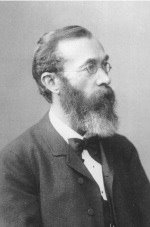This is not David Crowder

Introspection was by no means a new word coined by Wundt, known to some as the founder of Psychology. The term itself was common as far back as St Augustine and Descartes who used this technique to find the essence of God and certain truth respectfully. In addition, his approach stood in contrast with the empiricists and sensationalists pure introspection that focused more on ideas and association. Wundt referred to his approach as experimental introspection which highlighted a more scientific method that utilized laboratory instruments to vary the conditions of a testing environment. This, he believed delivered more precise results of internal perception. According to Hilgard (1987, p.44), the ideal was to make introspection, in the form of internal perception, as precise as external perception.
Wundt proposed that sensations and feelings were the two basic forms of mental experience. These two types worked together in the body in that all sensations were followed by feelings. He broke down the sensations into modalities known today as visual, auditory, kinesthetic, and gustatory. He pointed out that in normal life rarely are these modalities experienced in isolation from one another but instead are elements experienced simultaneously which ultimately leads to perception. Perception he believed was a passive process that was governed by the various present stimulations, hence his eventual emphasis on the active role of attention.
One experiment highlighted by Hunt (1994, p.135) used a ball dropping on a platform that would make a noise to be recognized by the subject. The experiment measured the time lag between when the sound was made and when the subject responded by pressing the telegrapher’s key. One distinct discovery was the difference between the recordings based on what the subject was instructed to do. In one instance the subject was told to press the key as soon as he heard the sound which recorded an involuntary reflexive response. In another instance the subject was instructed to press the key when he perceived the sound which led to noting a conscious voluntary response. These experiments measured the difference in duration between voluntary and involuntary responses and identified the conscious processes that occurred when perception awareness or experimental introspection was in play. This along with many other experiments led to the importance of attention and the size of its span.
The main benefit of Wundt’s approach and ideas behind introspection was the resulting ability to study immediate experience. Through this work he also brought to light the differences between voluntary and involuntary behaviour that has richly benefited the world of psychology. The downside of his idea is the separation from the immediate and higher mental processes which he believed to be out of scientific reach. This dualistic thinking limited discovery and led to an obvious tension and paradox of his work.
Wundt’s discoveries in regard to the importance of attention seem very applicable to the world we live in today when we consider MPD, schizophrenia, and ADHD. One aspect he speculated was that disorders like these could be the result of a breakdown of the attention process. His emphasis on attention, thinking, and creative synthesis has much relevance to research to the study of humanity in a diverse and distracting world.
From another angle however, I think it is beneficial to consider the reality of observer participancy. Did he just find what he was looking for in the way any of us can find a thread in a conversation that we believe to be true? or did his empirical studies deliver us the truth? In other words can we deduce perception from reality or does perception create reality?
O the joys of living in my head...
Mark Dowds

